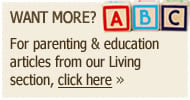Dear Rachel,
I read recently that parents should help children take responsibility for their own feelings. For example, according to this way of thinking, if your child gets very upset when someone teases her, you should teach her how to restore her emotional equilibrium. If she blames the other child for upsetting her, you should help her realize that she has a choice as to how to react. This advice leaves me feeling confused. I would have thought that the teasing child is to blame for causing upset to the other youngster. Am I wrong?
Confused Mom
Dear Confused,
I’m going to break your question into three:
- Does a child have a choice as to how to react to an external stressor?
- Is someone capable of inflicting emotional pain on someone else?
- How should a parent react when one child feels injured by another child?
In answer to the first question, a child (or adult, for that matter) always has a choice as to how to react behaviorally to an external stressor. For example, if Michael teases Aaron, Aaron can choose to push Michael down, call him a nasty name, threaten to tell his mother, ask him to please stop How should a parent react when one child feels injured by another child?doing that, walk away without saying anything, and so on. Each of these is a behavioral response, and Aaron can choose how he will respond. As it says in the Torah, “I have set before you life and death . . . Choose life.”1 We all have free will when it comes to our actions.
Emotional reactions are different, however. Our emotional reactions happen through the processes of our subconscious minds. We can’t choose to feel hurt or peaceful, frightened or calm, rage or resentment. Emotional responses happen faster than the speed of light, coming from a myriad of internal sources (neural pathways, genetic information, stored memories and meanings, etc.). We can learn to choose appropriate behavioral channels for expressing emotion, such as using words instead of our fists to express our sentiments. We can also learn to help calm our own emotional responses.
This latter technique, called “Emotional Regulation,” is appropriate to teach to children to help them negotiate their own inner world. If someone hurts them, you can teach them to self-soothe, recuperate, address the wound, and so on. This information should be taught to all kids, but in the specific situation where one child has hurt another, this information is pertinent to the victim.
As for the second question, the Torah view is that we are responsible if we inflict emotional pain on other people. In fact, there is a specific mitzvah to refrain from hurting people’s feelings with words, and of course there are many, many mitzvot involving refraining from hurting them physically, financially, emotionally, and so on.2 So a child’s hurtful behavior ought to hurt its victim. If you stab someone in the arm with a knife, you are directly responsible for that pain. The idea that no one can hurt our feelings is a secular innovation of 1960s–’70s psychology. In Judaism, someone who hurts another is held accountable for doing so, and therefore a parent can and should point out to a (perpetrator) child that his behavior has consequences for others.
So far, we’ve looked at the situation where one child teases, pushes or insults another. Now let’s address the parent’s reaction. Suppose that a sibling innocently walks by his sister, and the sister cries out to Mom, “He’s making faces at me!” In this case, Mom can ask the boy if this is what happened, and if it did, direct his attention to her sad face and her obvious upset. Mom can then do whatever other educational intervention is required. Is this a pattern that needs focused attention through discipline? Is it sufficient to impress upon him that his sister is now feeling hurt?
However, if he claims innocence—and parents tend to develop a fairly accurate perception of how innocent a child might be—then perhaps it is the little girl who needs to Parents tend to develop a fairly accurate perception of how innocent a child might beadjust her own emotional radar. The parent might say something like, “I don’t know for sure what happened, because I wasn’t there, and I hear David saying that he didn’t make a face. But I see that you feel hurt and upset because you think he did—and if he would have done such a thing, you would certainly feel hurt. Hashem doesn’t like us to hurt each other; He wants us all to be kind to each other. Of course, if we’re not absolutely sure if someone did something hurtful, we need to judge that person positively.”
This combination of emotional validation and education accomplishes a number of things. First, Dr. John Gottman has established through intensive research that emotional validation itself leads the child to develop the internal processes necessary for healthy emotional regulation. The more a child’s emotional world is validated, the more the child is able to self-soothe in stressful moments. Had Mom just said, “He didn’t do anything,” the invalidation would have likely led to the daughter becoming more emotionally oversensitive and reactive in the future.
In addition, the son hears his mother validating his sister. If he did have a role in the little girl’s pain, he has heard its emotional consequences. And while he may have been innocent on this particular occasion, chances are good that he is hurtful on other occasions. His mother’s statement can penetrate more easily right now precisely because he is not under direct attack. Third, the parent’s statement teaches the important Torah concepts that people need to be careful not to hurt others and remember to judge others positively.
In summary:
- Children are responsible for how they act in response to stress, but not for how they feel.
- We need to refrain from inflicting pain on others, and take responsibility when we have inflicted pain.
- Parents can help both perpetrator and victim. The perpetrator has the responsibility to develop appropriate empathy toward others, and to act in accordance with Hashem’s directives to refrain from hurting others. The victim has the responsibility to judge positively, to react in a behaviorally appropriate way, and to calm him- or herself down after injury. Parents can help victims become better at emotional regulation by validating the emotional pain they experienced.
I hope this answers your question, and I wish you luck on your parenting journey.









Confused, some people are more sensitive than others, and I couldn't handle teasing, either. My parents told me to ignore it and the teasing would eventually stop. It didn't always work, and I often expressed hostility and distrust of people because of it.
In today's world, teasing can lead to online bullying and even guns and knives if kids try to ignore teasing. It's very sad and unfortunate that the police sometimes have to get involved.
If you have children, you need to talk to them about this serious problem.